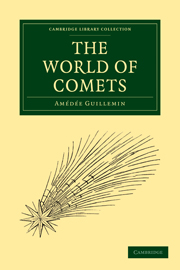Book contents
- Frontmatter
- EDITOR'S PREFACE
- PREFACE
- Contents
- LIST OF ILLUSTRATIONS
- CHAPTER I BELIEFS AND SUPERSTITIONS RELATIVE TO COMETS
- SECTION I COMETS CONSIDERED AS PRESAGES
- SECTION II COMETS IN GREEK AND ROMAN ANTIQUITY
- SECTION III THE COMETS OF THE MIDDLE AGES
- SECTION IV COMETS FROM THE RENAISSANCE TO THE PRESENT DAY
- CHAPTER II COMETARY ASTRONOMY UP TO THE TIME OF NEWTON
- CHAPTER III THE MOTIONS AND ORBITS OF COMETS
- CHAPTER IV PERIODICAL COMETS
- CHAPTER V PERIODICAL COMETS
- CHAPTER VI THE WORLD OF COMETS AND COMETARY SYSTEMS
- CHAPTER VII PHYSICAL AND CHEMICAL CONSTITUTION OF COMETS
- CHAPTER VIII PHYSICAL TRANSFORMATIONS OF COMETS
- CHAPTER IX MASS AND DENSITY OF COMETS
- CHAPTER X THE LIGHT OF COMETS
- CHAPTER XI THEORY OF COMETARY PHENOMENA
- CHAPTER XII COMETS AND SHOOTING STARS
- CHAPTER XIII COMETS AND THE EARTH
- CHAPTER XIV PHYSICAL INFLUENCES OF COMETS
- CHAPTER XV SOME QUESTIONS ABOUT COMETS
- I ELLIPTIC ELEMENTS OF THE RECOGNISED PERIODICAL COMETS OF THE SOLAR SYSTEM
- II GENERAL CATALOGUE OF THE ORBITS OF COMETS
- Plate section
SECTION IV - COMETS FROM THE RENAISSANCE TO THE PRESENT DAY
Published online by Cambridge University Press: 05 March 2012
- Frontmatter
- EDITOR'S PREFACE
- PREFACE
- Contents
- LIST OF ILLUSTRATIONS
- CHAPTER I BELIEFS AND SUPERSTITIONS RELATIVE TO COMETS
- SECTION I COMETS CONSIDERED AS PRESAGES
- SECTION II COMETS IN GREEK AND ROMAN ANTIQUITY
- SECTION III THE COMETS OF THE MIDDLE AGES
- SECTION IV COMETS FROM THE RENAISSANCE TO THE PRESENT DAY
- CHAPTER II COMETARY ASTRONOMY UP TO THE TIME OF NEWTON
- CHAPTER III THE MOTIONS AND ORBITS OF COMETS
- CHAPTER IV PERIODICAL COMETS
- CHAPTER V PERIODICAL COMETS
- CHAPTER VI THE WORLD OF COMETS AND COMETARY SYSTEMS
- CHAPTER VII PHYSICAL AND CHEMICAL CONSTITUTION OF COMETS
- CHAPTER VIII PHYSICAL TRANSFORMATIONS OF COMETS
- CHAPTER IX MASS AND DENSITY OF COMETS
- CHAPTER X THE LIGHT OF COMETS
- CHAPTER XI THEORY OF COMETARY PHENOMENA
- CHAPTER XII COMETS AND SHOOTING STARS
- CHAPTER XIII COMETS AND THE EARTH
- CHAPTER XIV PHYSICAL INFLUENCES OF COMETS
- CHAPTER XV SOME QUESTIONS ABOUT COMETS
- I ELLIPTIC ELEMENTS OF THE RECOGNISED PERIODICAL COMETS OF THE SOLAR SYSTEM
- II GENERAL CATALOGUE OF THE ORBITS OF COMETS
- Plate section
Summary
Slow improvement in the beliefs relative to comets–Bayle's remarks upon the comet of 1680–Passage from Madame de Sevigné's letter referring to this comet and the last hours of Mazarin–In the eighteenth century belief in the supernatural exchanged for belief in the physical influence of comets–Remains of cometary superstitions in the nineteenth century–The comet of 1812 and the Russian campaign ; Napoleon I. and the comet of 1769; the great comet of 1831 in Italy.
We have just seen that the superstitious ideas of the Middle Ages were yet dominant in the height of the Renaissance, since a man of learning like Ambrose Paré–no astronomer, it is true–could attribute to comets the same malign influences as those ascribed to them in- the year 1000, when the end of the world was confidently expected. Nor could it be otherwise, science not having then assigned to comets, in common with other extraordinary meteors, their true place in the order of nature.
Little by little, however, healthier ideas make their way, and to the supernatural influence of comets we shall now see gradually succeed in the minds of men of science and the more enlightened of the people the idea of an influence purely physical, at first under the form of simple hypotheses, and afterwards as a probability deduced from observations and facts.
- Type
- Chapter
- Information
- The World of Comets , pp. 26 - 32Publisher: Cambridge University PressPrint publication year: 2010First published in: 1877



